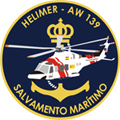Helimer 207-AW139 Crash in Spain 2010-Final report
A feeling of shame and sadness...
As always some people will only think the cause was a "pilot error", I recommend reading the full report, specially the recommendations about the COMPANY AND THE CIVIL AVIATION AUTHORITY.
You can download the report at the end of the article
The following factors contributed to the accident:
1.
Possible crew fatigue resulting from:
• The demands of the SAR operation.
• The excessive workload placed on the captain by assuming his own tasks and
responsibilities and many of the copilot’s.
• The excessive cognitive effort made by the copilot due to a lack of SAR experience
and to the effort required to understand and communicate in a foreign language.
2.
Inadequate crew training in SAR operations and CRM techniques that:
• Hampered the captain’s handling of the unresolved conflict between giving the
copilot more autonomy while fully confiding in his flying skills.
• Prevented the copilot from being sufficiently assertive to communicate his
difficulty in staying abreast of the flight due to the captain’s unreported actions
and his desire to complete the flight successfully with a captain who was very
much his senior.
• Impeded the captain and copilot from identifying and managing their fatigue.
• Impeded the crew’s handling of the transition between a highly demanding
activity (SAR exercises) and a routine activity (return flight).
• Resulted in the crew’s constant exposure and habituation to the LANDING GEAR
and ONE FIFTY FEET audio warnings, which made these warnings ineffective in
preventing the impact.
3. The definition and inappropriate use of SAR checklists not adapted to the helicopter
model and to SAR operations, and which included disengaging the Flight Director.
4. The lack of regulations specific to SAR operations in Spain and the low requirements
placed on the operator by the provider of the SAR service.
This report contains 17 safety recommendations for State Aviation Safety Agency
(AESA), as one of the bodies designated by Spain as its civil aviation authority, for the
Spanish Maritime Safety Agency (SASEMAR), the responsible of the SAR service, for
INAER HELICÓPTEROS OFF-SHORE, as the SAR operator, and for the European Aviation
Safety Agency (EASA), as the certifying authority for the emergency locator transmitter.





